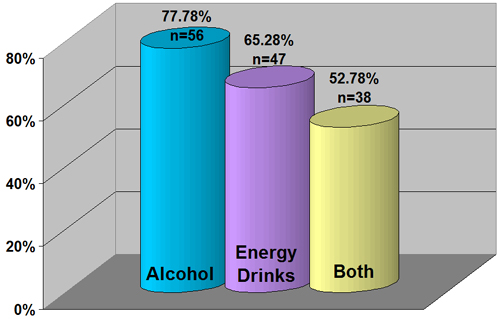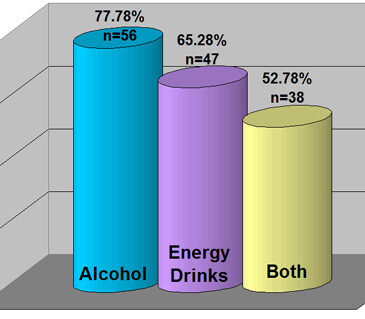It has become increasingly popular to consume alcohol with energy drinks (ED) (The STASH, Vol. 4(1); Oteri, Salvo, Caputi, & Calapai, 2007). Past research has shown that stimulants typically increase alcohol intake (Meisner, Darredeau, McLarnon, & Barrett, 2008). This week, the DRAM reviews an article that attempts to determine whether co-administration of alcohol and EDs leads to increased alcohol consumption (Price, Hilchey, Darredeau, Fulton, & Barrett, 2010).
Methods
- Researchers recruited 72 participants, aged 17 to 29, who consumed EDs from a Canadian university. Interviews assessed lifetime and past week alcohol and ED use.
- ED drinking sessions were instances of alcohol use that occurred within an hour of ED use; non-ED drinking sessions were instances of alcohol use that occurred without any ED use within an hour of alcohol use.
- For participants who had both ED and non-ED drinking sessions (n=10), the researchers used paired t-tests to compare the average alcohol consumption during each session type.
Results
- 76% (n=55) of the sample had co-administered EDs and alcohol (i.e., ED drinking sessions) in their lifetime.
- More than half of the participants consumed alcohol, EDs, or both during the past week; however, only 19.4% (n=14) reported past week ED drinking session(s) (see Figure).
- The 10 participants who had both ED and non-ED drinking sessions within the past week drank significantly more alcohol during ED-drinking sessions (M = 8.6 drinks) than non-ED drinking sessions (M = 4.7 drinks) [t (9) = 2.95, P = 0.016].

Figure. Prevalence of past week alcohol and ED consumption. Note: Of the 39 participants who reported drinking both alcohol and ED, only 14 participants (19.4% of the total sample) reported ED drinking session(s) and only 10 participants reported both ED and non-ED drinking sessions. Click image to enlarge.
Limitations
- The sample size consisted of a small number of students from one institution. The comparisons of ED drinking sessions and non-ED drinking sessions occurred within an even smaller sample. Consequently, these results might not generalize to other populations.
- Including only the past week of alcohol and ED use likely restricted the sample of individuals who practice co-administration. The participants reported a much higher lifetime prevalence of co-administration which suggests that this occurs more frequently than past-week data reports.
- The participants’ data is retrospective self-report. Although participants were asked to report past-week prevalence, the data could be retrospectively biased.
Discussion
The finding that 76% of the sample had co-administered alcohol and ED during the past week suggests that this practice is fairly common among college students. The group that combined ED and alcohol during the week prior to the study was very small (n = 10), but the results indicated an effect large enough to be statistically significant and support the finding that students drink more alcohol when they also drink EDs during a drinking session. Research suggests that co-administration is more risky than alcohol alone, because ED lowers the feeling of intoxication, but does not reduce the negative effects (e.g., motor impairment) or associated negative consequences (e.g. sexual assault) of alcohol (Ferreira, Mello, Pompeia, & de Souza-Formigoni, 2006).
— Tasha Chandler
What do you think? Please use the comment link below to provide feedback on this article.
References
Ferreira, S. E., Mello, M. T., Pompeia, S., & de Souza-Formigoni, M. L. (2006). Effects of energy drink ingestation on alcohol intoxication. Alcoholism: Clinical and Experimental Research, 30, 596-605.
Meisner, J. R., Darredeau, C., McLarnon, M. E., & Barrett, S. P. (2008). Extended release stimulant medication misuse with alcohol co-administration. Journal of the Canadian Academy of Child and Adolescent Psychiatry, 17(4), 181-182.
Oteri, A., Salvo, F., Caputi, A. P., & Calapai, G. (2007). Intake of energy drinks in association with alcoholic beverages in a cohort of students of the School of Medicine of the University of Messina. Alcoholism: Clinical and Experimental Research, 31(10), 1677-1680.
Price, S. R., Hilchey, C. A., Darredeau, C., Fulton, H. G., & Barrett, S. P. (2010). Energy drink co-administration is associated with increased reported alcohol ingestion. Drug and Alcohol Review, 29(3), 331-333.




